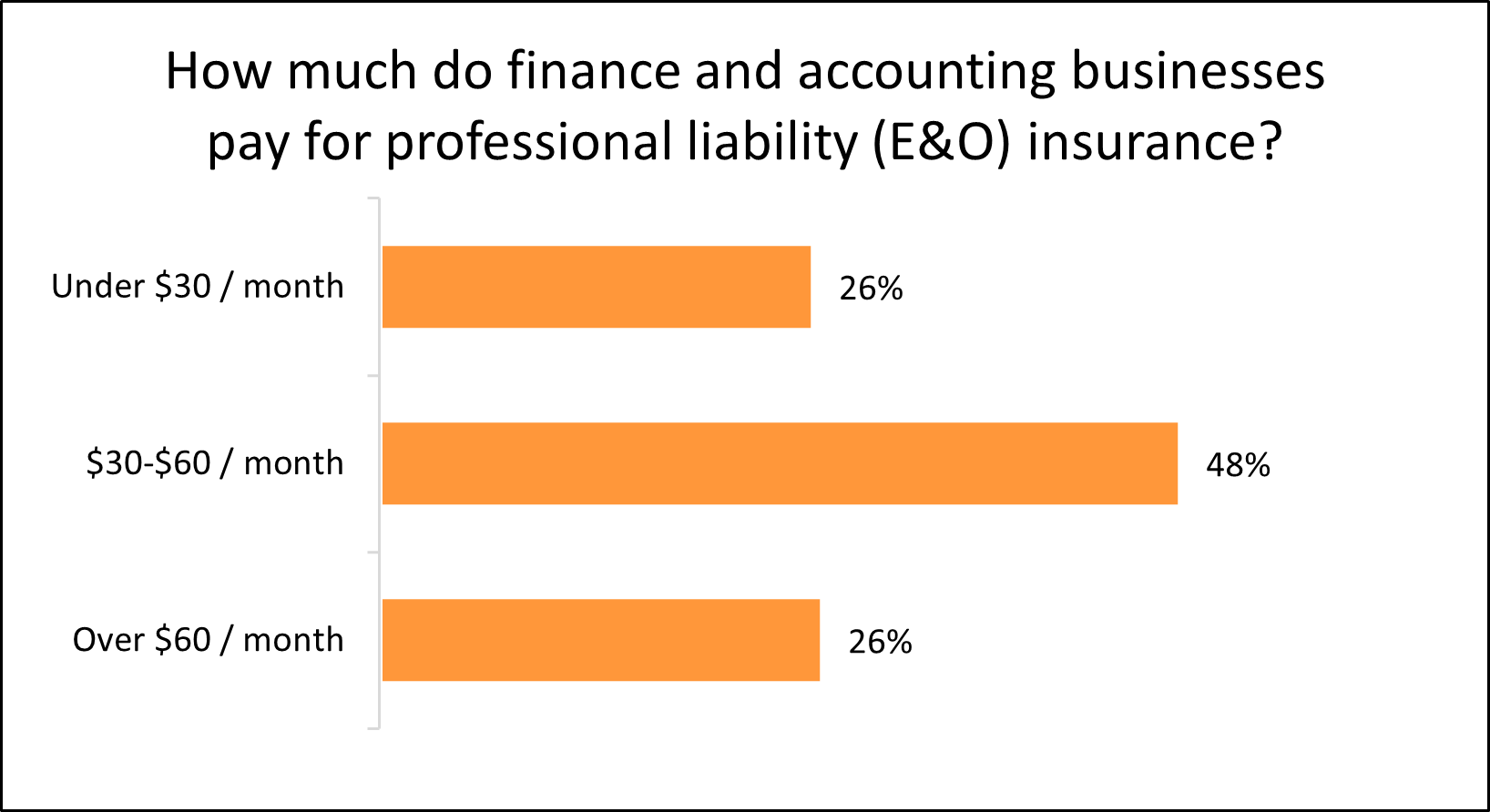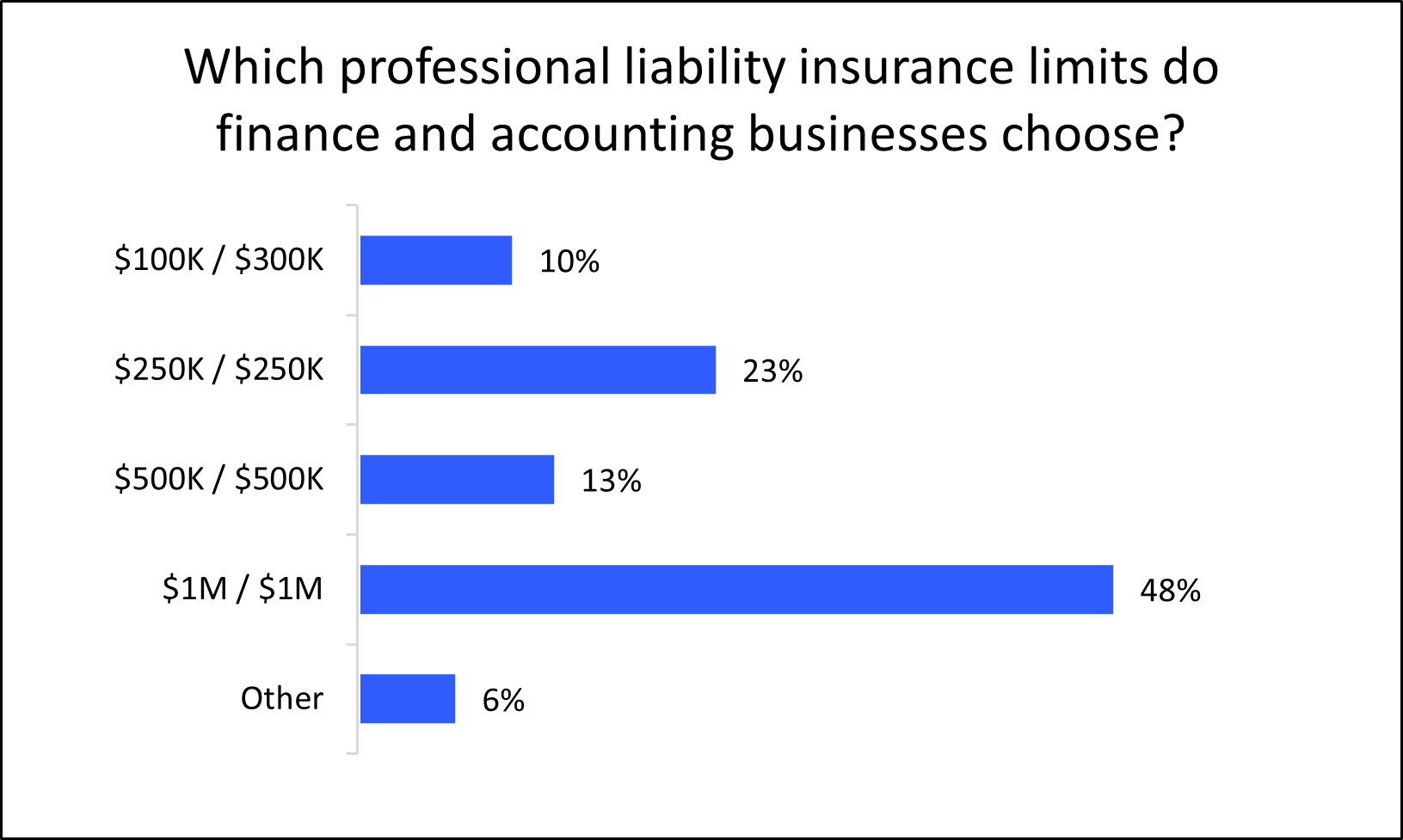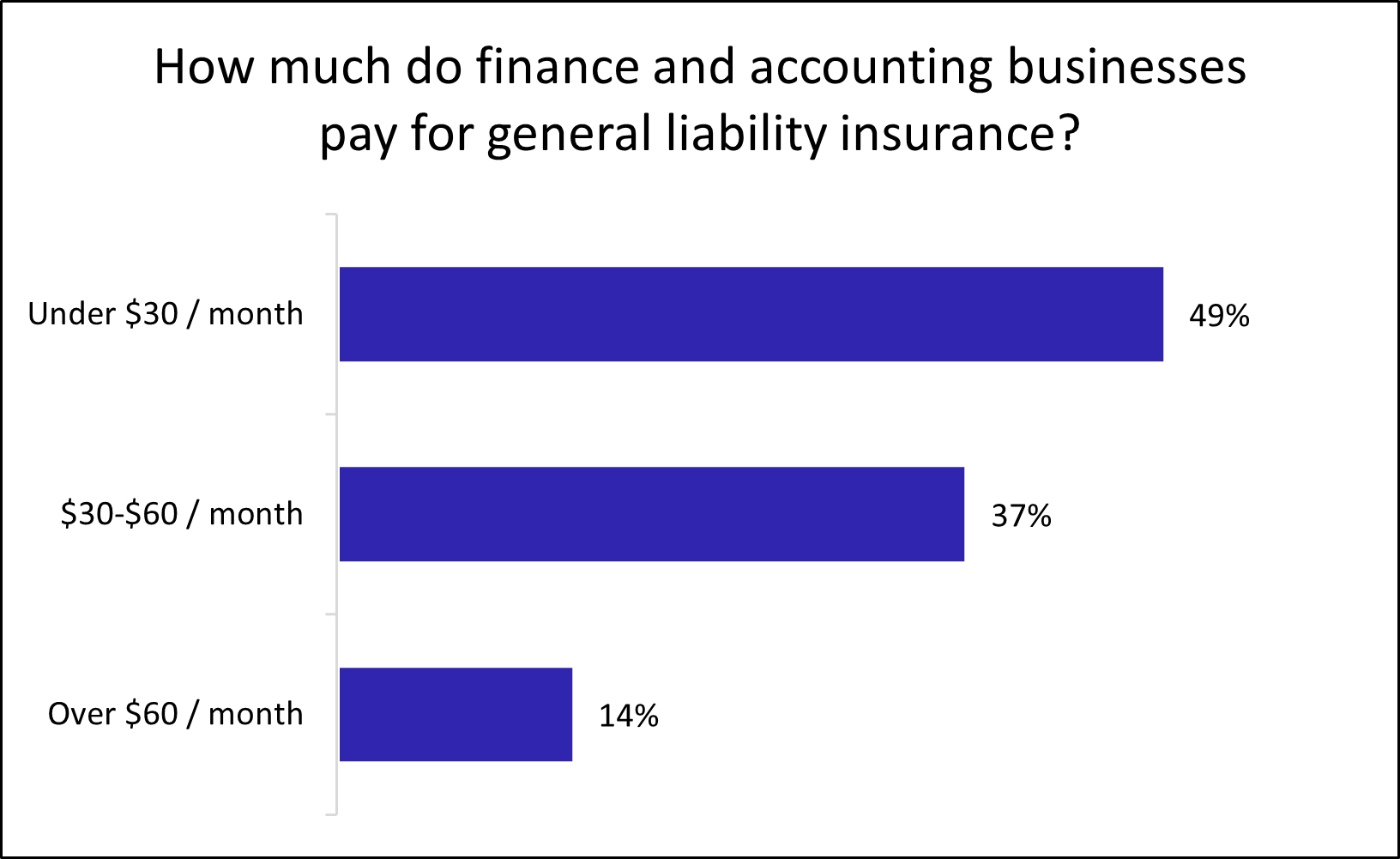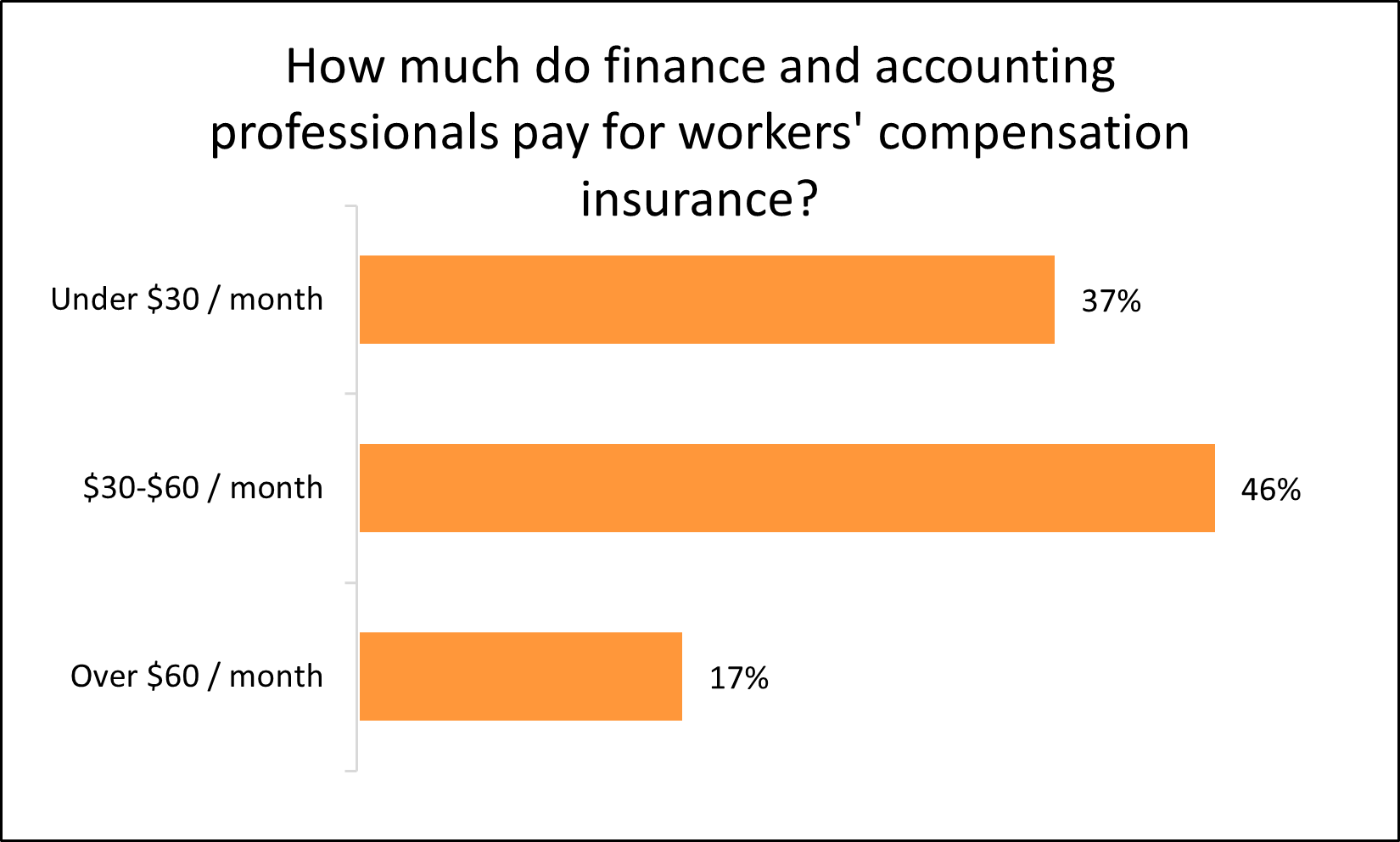
How much does accounting insurance cost?
The cost of accounting and finance business insurance depends on several factors, including the size of your business and its risks. Cost estimates are sourced from policies purchased by Insureon customers.
Key finance and accounting business insurance policies and their expected costs
Here are the top commercial insurance policies purchased by finance and accounting businesses and their average monthly costs:
- Professional liability insurance: $42 per month
- General liability insurance: $31 per month
- Business owner's policy (BOP): $56 per month
- Workers' compensation insurance: $34 per month
- Cyber insurance: $58 per month
- Commercial auto insurance: $147 per month
- Fidelity bonds: $38 per month
Our figures are sourced from the median cost of small business insurance policies purchased by Insureon customers who offer financial and accounting services, such as financial planners, bookkeepers, and stockbrokers. The median offers a better estimate of what your business is likely to pay because it excludes outlier high and low premiums.
The cost of business insurance depends on a number of factors. This includes the types of financial services you offer, your annual revenue, the value of your business property and equipment, your location, number of employees, the types of insurance products and bonds you purchase, and their policy limits and deductibles.
Professional liability insurance
Financial service and accounting professionals pay an average of $42 per month, or $500 annually, for professional liability insurance. This policy is sometimes referred to as errors and omissions (E&O) insurance.
A professional liability insurance policy offers critical coverage for finance and accounting businesses, including paying for legal fees related to accusations of professional negligence.
For example, if an accountant fails to submit a client's tax return on time, this policy would cover their attorney fees and other legal costs in the event of a lawsuit. It would also cover your business if you make errors or mistakes that result in financial loss for your client.
This is the average professional liability policy for finance and accounting businesses that buy from Insureon:
Premium: $42 per month
Policy limits: $1 million per occurrence; $1 million aggregate
Deductible: $1,000
The cost of professional liability insurance for finance and accounting professionals depends on several factors, such as the types of accounting and financial services you offer, your claims history, industry risks, and the policy limits you choose.
Your risk of a lawsuit drives the cost of professional liability
Among finance and accounting businesses that purchase a professional liability policy with Insureon, 26% pay less than $30 per month and 74% pay less than $60 per month.
Finance and accounting professionals who work with higher-risk individuals or specialize in certain areas may pay higher premiums due to their unique risks. Insurance companies will look at the type of professional services you offer and your finance firm's overall risk level when underwriting your premium.
Across all finance and accounting professions, learn how to get affordable professional liability insurance.

Professional liability policy limits for finance and accounting businesses
Policy limits are the maximum amounts your insurance company will pay for covered claims.
The per-occurrence limit is the most your insurer will pay for a single incident, while the aggregate limit is the maximum your insurer will pay on any claims during your policy period, typically one year.
Almost half of finance and accounting businesses (48%) choose professional liability policies with a $1 million per-occurrence limit and a $1 million aggregate limit.

General liability insurance
Financial services and accounting businesses pay an average of $31 per month, or $367 per year, for general liability insurance.
General liability insurance helps cover legal fees related to common third-party lawsuits from clients, including those related to bodily injuries, property damage, and advertising injuries. For example, a client could slip on a wet floor in your office, then sue your business to recoup the cost of medical treatment for their injury.
This is the average general liability policy for finance and accounting businesses that buy from Insureon:
Insurance premium: $31 per month
Policy limits: $1 million per occurrence; $2 million aggregate
The cost of general liability insurance depends on several factors, such as the coverage limits you choose, the size of your business, the amount of foot traffic you have, your location, and any endorsements on your policy, such as an additional insured.
Your business risks affect the cost of general liability insurance
General liability insurance costs increase with the likelihood of customer lawsuits, such as someone suing your business over a slip-and-fall injury. That's why businesses with an office that is open to the public can expect to pay more for this coverage than a home-based business.
This leads to a wide range of insurance premiums for different professions. Among finance and accounting companies that purchase general liability insurance with Insureon, 49% pay less than $30 per month and 86% pay $60 or less per month.
Most finance and accounting businesses (88%) choose general liability policies with a $1 million per-occurrence limit and a $2 million aggregate limit. As your small business grows, you may need to expand your policy limits.

Business owner’s policy
Finance and accounting firms pay an average of $56 per month, or $671 per year, for a business owner’s policy.
A business owner's policy, or BOP, bundles general liability coverage with commercial property insurance to cover both third-party risks and your business property. It typically costs less than purchasing each policy separately.
A BOP protects against client injuries and property damage. In addition, this type of insurance covers the repair or replacement costs of your physical building and office equipment if they're damaged due to vandalism and other covered claims.
Because of its increased coverage and affordability, it’s the policy most often recommended by Insureon’s agents for small business owners who rent or own a building.
This is the average BOP for finance and accounting businesses that buy from Insureon:
Insurance premium: $56 per month
Policy limits: $1 million per occurrence; $2 million aggregate
Deductible: $500
Small, low-risk finance and accounting companies are often eligible for a business owner's policy.
Small business owners may see higher costs if they choose to add endorsements to their policy. Insurance endorsements, such as business interruption insurance or equipment breakdown coverage, are often recommended to help avoid financial losses if a fire or power outage forces your business operations to cease for an extended period of time.
The cost of a business owner's policy is based on a number of factors. That includes the value of your property, where you are located, the number of employees you have, and your specialty.
The cost of a BOP is driven by business property value
Financial institutions with larger or more expensive business property will typically pay more for a BOP than those with smaller premises or lower value business property.
Your industry risk, years in operation, and claims history will also affect your insurance rates.

Workers’ compensation insurance
For finance and accounting businesses, workers’ compensation insurance costs an average of $34 per month, or $414 per year.
This insurance policy covers medical expenses when an employee is injured on the job, and it also provides disability benefits while they're recovering and unable to work.
To comply with your state’s requirements and avoid penalties, businesses with employees typically must purchase this coverage. It's also recommended for sole proprietors, as health insurance plans can deny claims for medical bills when an injury or illness is related to your job.
Most policies include employer's liability insurance, which covers the cost of lawsuits related to workplace injuries. There's usually no limit to how much a workers' comp policy can pay for employee benefits, though it depends on state laws.
The cost of workers' compensation insurance depends on several factors, including the number of employees you have and the level of risk involved with their jobs.
Get more information on how to find affordable workers' compensation coverage.
Workers' comp costs depend on the number of employees
Among finance and accounting companies that buy workers’ compensation insurance with Insureon, 37% pay less than $30 per month and 83% pay $60 or less per month.
Workers' comp costs depend on the number of employees you have in your small business. A larger workforce brings a higher risk of work-related injuries, which is why bigger businesses tend to pay more for this type of insurance.

Cyber insurance
Companies that offer financial advice or services pay an average of $58 per month, or $701 annually, for cyber insurance. This policy is also called cyber liability insurance or cybersecurity insurance.
Cyber insurance helps businesses recover financially after a data breach or cyberattack. It can help pay for customer notification costs, fraud monitoring services, and other expenses necessitated by state data breach laws.
The cost of cyber insurance depends on the amount of sensitive information handled by your financial or accounting practice, such as client Social Security numbers and credit card information, along with the number of employees who can access that information.
Commercial auto insurance
Small businesses, including CPA firms and other types of finance and accounting companies, pay an average of $147 per month, or $1,762 annually, for commercial auto insurance.
Most states require this liability insurance coverage for vehicles owned by a finance or accounting business. For personal, rented, and leased vehicles used by your business, look to hired and non-owned auto insurance (HNOA) instead.
A commercial auto policy provides financial protection in the event of an accident involving your business vehicle. It can help pay for property damage, medical costs, and legal expenses.
The cost of commercial auto insurance depends on several factors, including the policy limits you choose, coverage options, the value of the vehicles, the driving records of anyone permitted to drive, and additional insured endorsements you select.
Learn more about how to find affordable commercial auto insurance coverage.
Fidelity bonds
Finance and accounting businesses pay an average of $38 per month, or $454 annually, for a fidelity bond.
Fidelity bonds provide reimbursement if one of your employees commits fraud, theft, or forgery against a client or your business, including illegal electronic funds transfer. They are often required by client contracts.
The cost of a fidelity bond is a percentage of the total bond amount. It may also be influenced by your type of work and your credit score.
How do you buy finance and accounting business insurance with Insureon?
Insureon works with top-rated U.S. providers to find affordable insurance coverage for financial service and accounting businesses, whether you work independently or own a firm with employees.
Apply today to get free quotes with our easy online application. A licensed insurance agent who specializes in your profession's unique risks will help you find the right types of coverage for your business needs. Typically, you can get a certificate of insurance within 24 hours of submitting your application, offering instant peace of mind.
What our customers are saying

Want free expert advice right in your inbox?
By entering your email address and subscribing, you agree to our Terms of Use and Privacy Policy




